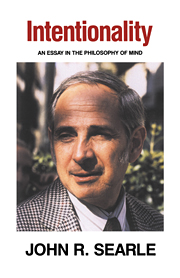Book contents
- Frontmatter
- Contents
- Acknowledgements
- Introduction
- 1 The nature of Intentional states
- 2 The Intentionality of perception
- 3 Intention and action
- 4 Intentional causation
- 5 The Background
- 6 Meaning
- 7 Intensional reports of Intentional states and speech acts
- 8 Are meanings in the head?
- 9 Proper names and Intentionality
- 10 Epilogue: Intentionality and the brain
- Subject index
- Name index
1 - The nature of Intentional states
Published online by Cambridge University Press: 05 June 2012
- Frontmatter
- Contents
- Acknowledgements
- Introduction
- 1 The nature of Intentional states
- 2 The Intentionality of perception
- 3 Intention and action
- 4 Intentional causation
- 5 The Background
- 6 Meaning
- 7 Intensional reports of Intentional states and speech acts
- 8 Are meanings in the head?
- 9 Proper names and Intentionality
- 10 Epilogue: Intentionality and the brain
- Subject index
- Name index
Summary
INTENTIONALITY AS DIRECTEDNESS
As a preliminary formulation we might say: Intentionality is that property of many mental states and events by which they are directed at or about or of objects and states of affairs in the world. If, for example, I have a belief, it must be a belief that such and such is the case; if I have a fear, it must be a fear of something or that something will occur; if I have a desire, it must be a desire to do something or that something should happen or be the case; if I have an intention, it must be an intention to do something. And so on through a large number of other cases. I follow a long philosophical tradition in calling this feature of directedness or aboutness ‘Intentionality’, but in many respects the term is misleading and the tradition something of a mess, so at the very beginning I want to make it clear how I intend to use the term and in so doing to dissociate myself from certain features of the tradition.
First, on my account only some, not all, mental states and events have Intentionality. Beliefs, fears, hopes, and desires are Intentional; but there are forms of nervousness, elation, and undirected anxiety that are not Intentional. A clue to this distinction is provided by the constraints on how these states are reported.
- Type
- Chapter
- Information
- IntentionalityAn Essay in the Philosophy of Mind, pp. 1 - 36Publisher: Cambridge University PressPrint publication year: 1983
- 2
- Cited by

